|
|
|
Sort Order |
|
|
|
Items / Page
|
|
|
|
|
|
|
| Srl | Item |
| 1 |
ID:
106597
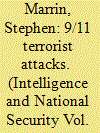

|
|
|
|
|
| Publication |
2011.
|
| Summary/Abstract |
The 9/11 terrorist attacks have been intensively examined as both tactical and strategic intelligence failures but less attention has been paid to the policy failures which preceded them. Perhaps this is due to the presumption that intelligence analysis influences decision-making as a precursor to and foundation for policy. This assumption about the influence of analysis on decision deserves a much closer examination. The 9/11 terrorist attacks provide a good case to study for greater understanding of the influence, or lack of influence, that intelligence analysis has on decision-making. Specifically, the 9/11 Commission Report identifies as a significant failure the lack of a National Intelligence Estimate on the terrorist threat between 1998 and 2001, and implies that if one had been produced it might have helped enable decision-makers to prevent the 9/11 attacks. In other words, a failure of strategic intelligence analysis lay at the foundation of the failure to prevent 9/11. But was this really the case? This article takes a closer look at the case of the missing National Intelligence Estimate by first evaluating what decision-makers knew about the threat prior to the 9/11 attacks, the policies they were implementing at the time, and the extent to which the hypothetical National Intelligence Estimate described by the 9/11 Commission would have mattered in terms of influencing their judgement and policy for the better. It concludes that the 9/11 terrorist attacks were more a failure of policy than strategic intelligence analysis.
|
|
|
|
|
|
|
|
|
|
|
|
|
|
|
|
| 2 |
ID:
171238
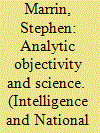

|
|
|
|
|
| Summary/Abstract |
Analytic objectivity as a standard for the US Intelligence Community appears to have been drawn from idealized conceptualizations of the scientific method as a kind of value-neutral epistemological framework used to develop knowledge “objectively.” But this embrace of objectivity provides a poor foundation for contemporary conceptualizations of the applied epistemology of intelligence analysis, as well as performance standards. Instead, intelligence analysts should embrace a more realistic goal of aspiring to but never actually achieving analytic objectivity through the reduction of subjectivity while embracing the values of honesty, neutrality, and integrity encapsulated in the phrase “calling it as you see it”.
|
|
|
|
|
|
|
|
|
|
|
|
|
|
|
|
| 3 |
ID:
123295


|
|
|
|
|
| Publication |
2013.
|
| Summary/Abstract |
Many people point to high profile failures like 9/11 and Iraq as indicators that CIA's analytic performance is inadequate or flawed. Flawed by design.1 A legacy of ashes.2 A culture of failure.3 Or so goes the conventional wisdom. Fortunately this conventional wisdom is wrong. These so-called failures more accurately represent the perennial dilemmas and tradeoffs associated with the analytic function and, most importantly, the inappropriate expectation that these observers hold of CIA's ability to prevent surprises. As a matter of fact, there is much that people do not fully understand about the CIA.
|
|
|
|
|
|
|
|
|
|
|
|
|
|
|
|
| 4 |
ID:
159922
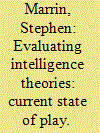

|
|
|
|
|
| Summary/Abstract |
This article evaluates the current state of play regarding the growing number of references to intelligence theory in the intelligence studies literature, with preliminary observations as follows: while most new contributions are extensions or enhancements of existing theories, new intelligence theories have been quite valuable in terms of enhancing understandings of intelligence as a function of government, with additional theories being developed outside the intelligence studies literature. Looking ahead, the development of schools of thought for theories built around particular kinds of questions would help enhance intelligence studies scholarship through debates over definitions, ontological understandings, epistemological frameworks, and theories.
|
|
|
|
|
|
|
|
|
|
|
|
|
|
|
|
| 5 |
ID:
116175
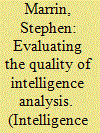

|
|
|
|
|
| Publication |
2012.
|
| Summary/Abstract |
Each of the criteria most frequently used to evaluate the quality of intelligence analysis has limitations and problems. When accuracy and surprise are employed as absolute standards, their use reflects unrealistic expectations of perfection and omniscience. Scholars have adjusted by exploring the use of a relative standard consisting of the ratio of success to failure, most frequently illustrated using the batting average analogy from baseball. Unfortunately even this relative standard is flawed in that there is no way to determine either what the batting average is or should be. Finally, a standard based on the decision-makers' perspective is sometimes used to evaluate the analytic product's relevance and utility. But this metric, too, has significant limitations. In the end, there is no consensus as to which is the best criteria to use in evaluating analytic quality, reflecting the lack of consensus as to what the actual purpose of intelligence analysis is or should be.
|
|
|
|
|
|
|
|
|
|
|
|
|
|
|
|
| 6 |
ID:
153082
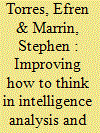

|
|
|
|
|
| Summary/Abstract |
Common thinking strategies can be used by both intelligence analysts and medical doctors to improve decision-making and produce positive outcomes. Best practices can flow in both directions between professions since medicine shares strong parallels with intelligence analysis. Improving performance in both fields involves an assessment of key problems and current efforts to overcome them. Perhaps the most important issues affecting both fields are related to cognition. In medicine and intelligence analysis, errors are often triggered by cognitive biases that appear during the decision-making process. Identifying and preventing these errors would contribute towards improving performance and results in both fields.
|
|
|
|
|
|
|
|
|
|
|
|
|
|
|
|
| 7 |
ID:
143760
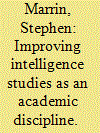

|
|
|
|
|
| Summary/Abstract |
As the field of intelligence studies develops as an academic complement to the practice of national security intelligence, it is providing a base of knowledge for intelligence practitioners to interpret their past, understand their present, and forecast their future. It also provides the basis for broader understanding of intelligence as a function of government for other government and security officials, academicians, and the general public. In recent years there has been significant growth in the numbers and kinds of intelligence-related educational and training opportunities, with the knowledge taught in these courses and programs derived from the body of intelligence studies scholarship. The question posed here is: to what extent is this body of knowledge sufficient as a basis for the development of intelligence studies as an academic discipline?
|
|
|
|
|
|
|
|
|
|
|
|
|
|
|
|
| 8 |
ID:
080334
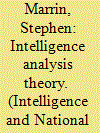

|
|
|
|
|
| Publication |
2007.
|
| Summary/Abstract |
Theoretical work involves explanation and prediction, but thus far there has been little scholarly work explaining and predicting the role of intelligence analysts in support of foreign and national security policies. Without a theory of intelligence, it becomes difficult to decide what the appropriate substantive analytical responsibilities of the intelligence community should be. Accordingly, a theory of foreign intelligence analysis is necessary. This paper presents a theoretical framework developed during the immediate post-Cold War timeframe to explain why there was such a wide variety of perspectives regarding the future need for intelligence, embeds these ideas within the existing intelligence theory literature, applies this framework more generally in a way that can be used to explain variations in the substantive coverage of intelligence analysis in the past and predict possible variations in the future, and then tests the theory's ability to explain the analytical focus of domestic intelligence organizations
|
|
|
|
|
|
|
|
|
|
|
|
|
|
|
|
| 9 |
ID:
116161
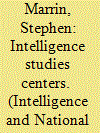

|
|
|
|
|
| Publication |
2012.
|
| Summary/Abstract |
Improving intelligence analysis requires bridging the gap between scholarship and practice. Intelligence studies as an academic discipline is not very theoretical compared to the more established disciplines of political science and international relations. In terms of conceptual depth, levels of abstraction and theoretical development, even the theoretical portions of the academic intelligence studies literature could be described as policy relevant and potentially useful for practitioners, including intelligence analysts. Yet despite this orientation to the practitioner, there is still a substantial gap between scholars and practitioners, thus replicating within a more applied context the conventional theory/practice divide that exists in other fields. Those fields do, however, possess a variety of ideas and recommendations that could be used to bring scholarship on intelligence analysis closer to practice. If implemented, these ideas might help actualize the benefits of scholarship that are as yet still unrealized potential.
|
|
|
|
|
|
|
|
|
|
|
|
|
|
|
|
| 10 |
ID:
114205
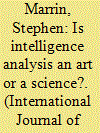

|
|
|
| 11 |
ID:
091748
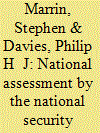

|
|
|
|
|
| Publication |
2009.
|
| Summary/Abstract |
At a time of intense debate over the specific organizational arrangements of American national security agencies with new or refocused intelligence responsibilities, the relative proximity between intelligence producers and consumers is a key issue. Intelligence capabilities may have to be kept separate from decision-making because of organizational economies of scale and scope, but separation alone does not mean intelligence must be distant from decision-making. For example, the British style of analysis involves a much closer relationship between intelligence producers and consumers than exists in the American context. Efforts to improve the integration of intelligence into decision-making by closing the distance between them would do well to study the history and efficacy of this process as they look to create new ways of structuring the relationship between intelligence analysis and decision-making. Specifically, history demonstrates that the US National Security Council staff implemented a process in 1968 through 1980 that approximated the British style of analysis, and this may provide US policymakers with a model for bridging the gap between intelligence analysis and decision-making.
|
|
|
|
|
|
|
|
|
|
|
|
|
|
|
|
| 12 |
ID:
118367
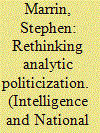

|
|
|
|
|
| Publication |
2013.
|
| Summary/Abstract |
Politicization as a term used in intelligence studies is poorly defined, conceptualized and operationalized. Despite the negative connotations associated with the word politicization that equate it with a form of corruption, it is not entirely clear what it is a corruption of. In short, the concept of politicization is for the most part analytically useless. This article critiques the existing status quo conceptualization for being overly broad and insufficiently nuanced, explores the nature of analytic politicization as a subset of politicization writ large, and replaces it with a narrower conceptualization that explains what makes analytic politicization bad and deserving of condemnation. Based on this evaluation, one can conclude that much of what is considered to be politicization in a corrupted sense is really just a naturally-occurring consequence of analysis and interpretation in a policy or political context.
|
|
|
|
|
|
|
|
|
|
|
|
|
|
|
|
| 13 |
ID:
118365
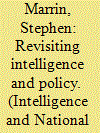

|
|
|
|
|
| Publication |
2013.
|
| Summary/Abstract |
The relationship between intelligence and policy has its ups and downs. Sometimes the relationship is a good one; communication flows and both sides benefit from the interaction. The optimal outcome entails the use of accurate intelligence analysis to improve decision-making. But sometimes difficulties arise and problems develop. For example, when knowledge is required for decision but is not available or is inaccurate the outcome is frequently described as an intelligence failure. A subset of this kind of intelligence failure occurs when knowledge is distorted in order to reinforce or oppose policymaker preferences or expectations. Another less successful outcome occurs when good, accurate knowledge is not used to improve policy, but is instead set aside or ignored by those who have the responsibility and obligation to make decisions. This set of articles explores the difficulties that can arise in the relationship between intelligence and policy.
|
|
|
|
|
|
|
|
|
|
|
|
|
|
|
|
| 14 |
ID:
087557
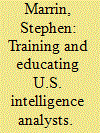

|
|
|
|
|
| Publication |
2009.
|
| Summary/Abstract |
In the United States, the training and education of national security intelligence analysts in both government and academia is undergoing significant changes. Most of them are associated with efforts to improve the quality of analysis in the wake of the 11 September 2001 (9/11) terrorist attacks on New York City and Washington, D.C., and the controversy over the accuracy of intelligence regarding Iraq's weapons of mass destruction (WMD) programs. Additional changes are likely as analytic training is subsumed into a broader national effort to professionalize the country's analytic corps.
|
|
|
|
|
|
|
|
|
|
|
|
|
|
|
|
| 15 |
ID:
153074
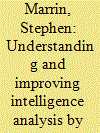

|
|
|
|
|
| Summary/Abstract |
Intelligence organizations acquire, evaluate, assess, and disseminate information to support national security and foreign policy decision-making. It is part of a government’s efforts to get as close to complete information as possible about both the operating environment as well as other actors. The methodologies employed by intelligence analysts are similar to yet different from those used in many other academic disciplines and professional fields. This discussion about methodology – a form of comparative applied epistemology – can be used to better understand intelligence analysis as a function of government and improve the performance of intelligence analysts.
|
|
|
|
|
|
|
|
|
|
|
|
|
|
|
|
| 16 |
ID:
154858
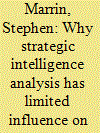

|
|
|
|
|
| Summary/Abstract |
Why does strategic intelligence analysis have limited influence on American foreign policy? Intelligence analysis is frequently disregarded, this paper contends, because it is a duplicated step in the decision-making process and supplements but does not supplant policy assessment. Many intelligence analyses will confirm policy assessments and be redundant or – if the assessments are different – policy-makers will choose their own interpretations over those of intelligence analysts. The findings of this paper provide scholars with important insights into the limits of intelligence analysis in the foreign policy process as well as recommendations for increasing its positive impact on policy.Why does strategic intelligence analysis have limited influence on American foreign policy? Intelligence analysis is frequently disregarded, this paper contends, because it is a duplicated step in the decision-making process and supplements but does not supplant policy assessment. Many intelligence analyses will confirm policy assessments and be redundant or – if the assessments are different – policy-makers will choose their own interpretations over those of intelligence analysts. The findings of this paper provide scholars with important insights into the limits of intelligence analysis in the foreign policy process as well as recommendations for increasing its positive impact on policy.
|
|
|
|
|
|
|
|
|
|
|
|
|
|
|
|
|
|
|
|
|